
What does vertigo feel like?
Vertigo is the physical sensation that the world is spinning around you, or that you are spinning while the world stands still. “In addition to this dizzying sensation, you may have nausea or double vision as associated symptoms. Some people also have decreased hearing or ringing in their ears based on the cause of their vertigo,” says neurologist Arif Dalvi, MD, MBA, of Palm Beach Neuroscience Institute in Boynton Beach, Florida. (Here’s how to know if you’re suffering from vertigo.)
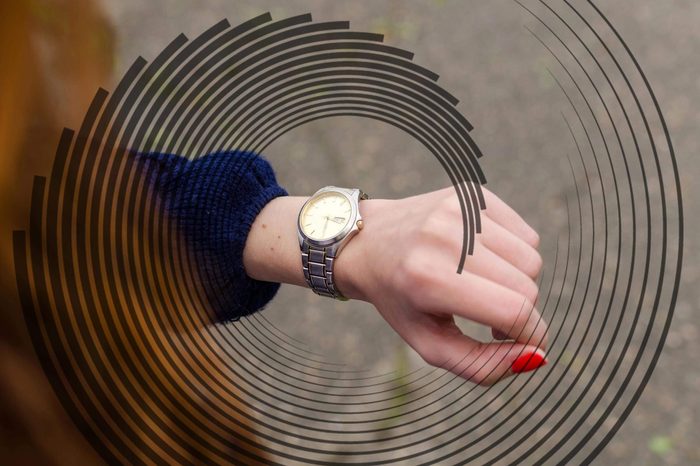
How long does vertigo last?
“The duration of vertigo depends on the cause. With more benign causes it may last a few minutes, but other causes may have vertigo lasting for hours, days, or even weeks,” says Dr. Dalvi. Accurately identifying the length of time your vertigo lasts is very important. This piece of information will help your doctor to determine vertigo causes. (Here are some ways to cope with vertigo.)
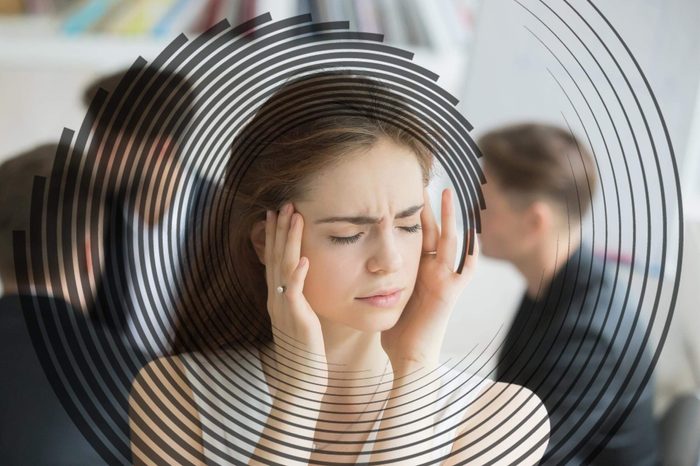
Vertigo is a symptom, not a stand-alone disease
Vertigo can be a symptom of many different conditions. Some are more serious than others, but no matter what the cause, vertigo often resolves on its own or can be treated successfully. “Many of the diseases that cause vertigo affect the vestibular system. The vestibular system is a neuropathway in the inner ear, that senses motion, and is responsible for detecting the location of our body, relative to the objects around us. In certain medical conditions, an inappropriate, or false signal may be sent through the vestibular nerve onto other areas of the brain. When this occurs, the brain perceives the false signals as movement and we, in turn, experience vertigo,” explains Derek Bennetsen, DO, an emergency physician at The Colony ER Hospital in The Colony, Texas. It’s important to find out the reason why you are experiencing vertigo. Treating this sole symptom will not be enough to cure many of its underlying causes. (Does your head hurt? Here are the different types of headaches and how to get rid of them.)
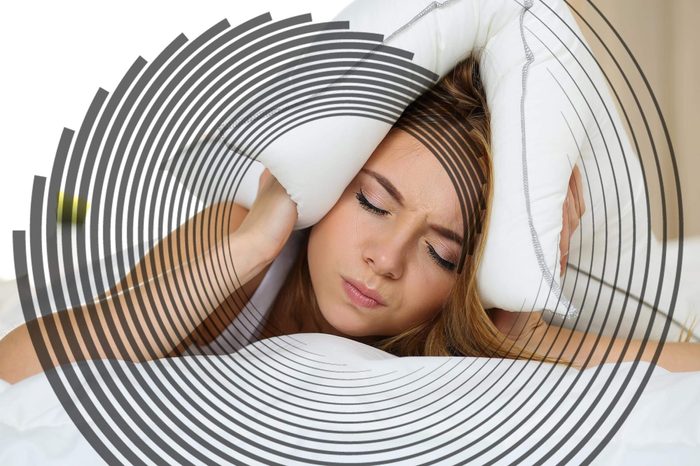
What type of vertigo is it?
Most diagnoses of vertigo fall into two categories—peripheral or central, according to the National Institutes of Health’s MedlinePlus. All that means is that the source of trouble is in your inner ear (peripheral) or the problem is with your nervous system (central). There are several sub-categories of each, according to Upper Cervical Awareness, a vertigo patient group; peripheral vertigo is more common than central vertigo.
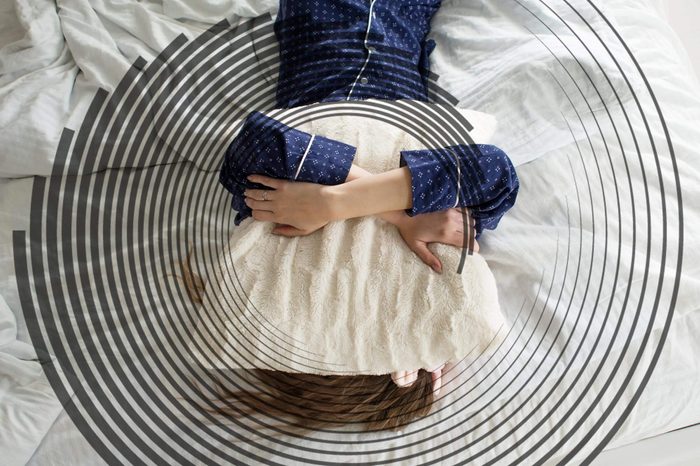
What causes vertigo when lying down?
This peripheral vertigo has quite the name: “Benign paroxysmal positional vertigo (BPPV), is the most common cause of vertigo,” says Dr. Bennetsen. One possible trigger for BPPV is an “otolith”—an inner-ear crystal made of calcium carbonate that is used to sense movement—but often the source of trouble is unclear. BPPV can last for a few seconds or up to several minutes, and often recurs over the course of many months. The dizziness associated with BPPV can range from mild to extreme and is triggered by sudden head movements, such as nodding. “A person with BPPV feels vertigo while turning their head quickly, such as occurs when rolling over in bed. They may also have darting movements of the eyes, called nystagmus,” adds Dr. Dalvi. Other movements which might trigger this form of vertigo include sitting up after reclining, lying down after sitting, and standing up. According to the Mayo Clinic, women get BPPV more than men and people of both genders over age 50 are more likely to get it than their younger counterparts. However, BPPV can occur to anyone.
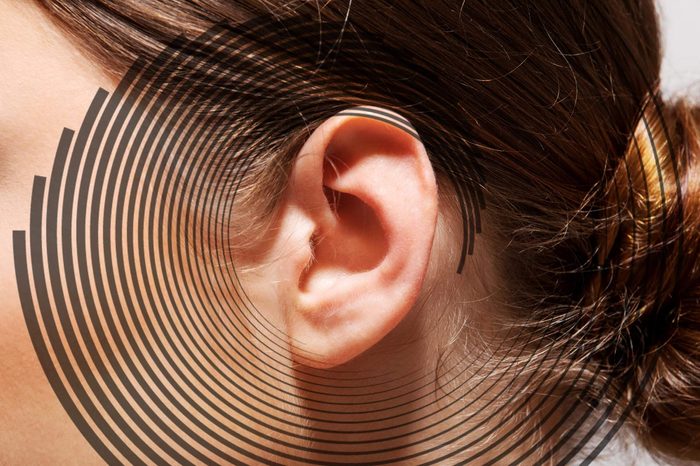
Ménière’s disease and vertigo
Ménière’s disease is a disorder of the inner ear, which causes vertigo, ringing in the ears, and hearing loss. It is a chronic condition, with no cure, but patients can manage and reduce symptoms, according to Ian Swinburne, PhD, research fellow in systems biology at Harvard Medical School and a Hearing Health Foundation grantee who specializes in Ménière’s disease. “Vertigo caused by Ménière’s disease is likely brought on by episodes of inner ear malfunction. The cause of Meniere’s disease is poorly understood, but several lines of evidence suggest that the internal environment of the ear becomes out of control. For the ear to normally sense our body’s movement, it must maintain an environment within the organ such that specialized cells that detect our head’s movement can function properly. Bouts of vertigo likely arise in patients with Meniere’s disease, because the inner ear’s tissue tears from too much fluid pressure—causing the ear’s internal environment to become abnormal,” he explains. (Psst: Here’s how you should be cleaning your ears.)

Sailors, beware
Mal de debarquement causes vertigo in people who have spent time on boats. Some experts also believe this phenomenon can occur after driving or flying, although sea travel is the most common cause. “Leaving a cruise ship, and stepping onto dry land can cause someone to feel dizzy or off-balance,” explains Dr. Bennetsen. According to VeDA, a not-for-profit organization focused on vestibular disorders, mal de debarquement can even occur when someone gets out of a waterbed. “This form of vertigo is typically short-lasting, but like all vertigo, can cause an unsettling, scary feeling,” adds Dr. Bennetsen. (Get sea- or car-sick? Here’s a natural remedy for motion sickness.)
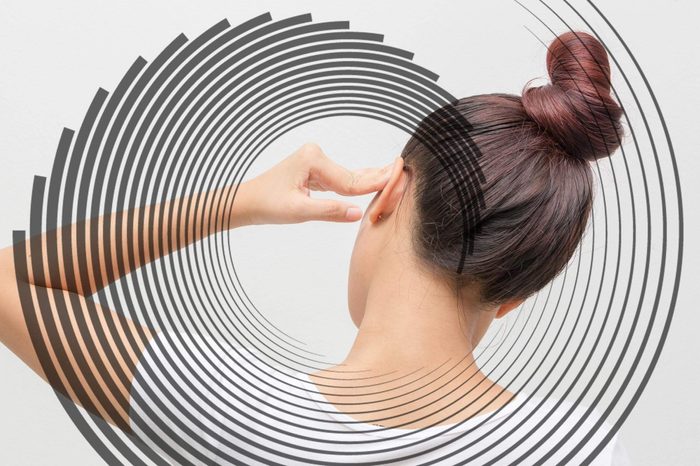
Acute labyrinthitis and vertigo
Since peripheral vertigo is caused by malfunctions within the inner ear, it should come as no surprise that ear infections may cause vertigo. “Infections of the inner ear can lead to a severe form of vertigo called acute labyrinthitis,” says Dr. Dalvi. “Acute labyrinthitis is most commonly caused by a viral infection, such as herpes simplex. Other ear infections, such as otitis media, can also cause vertigo,” he adds. (See why one woman needed hearing aids before the age of 50.)

Vestibular neuronitis and vertigo
This condition affects the vestibulocochlear nerve, located within the inner ear. When this nerve becomes inflamed, it inhibits the ability of the brain to accurately process information about the head position and balance. This causes severe, extreme peripheral vertigo and other symptoms such as difficulty concentrating. According to Cleveland Clinic, vestibular neuronitis may be caused by viral infections such as shingles, herpes simplex, measles, polio, hepatitis, flu, chickenpox, and the mumps.

This just in—stress isn’t good for anything, including vertigo (shocker)
There is very little that stress can’t make worse—including vertigo. “The question about stress causing vertigo is an interesting one. People have examined this for some time, and the answer is, ‘it depends,'” says Rick Pescatore, DO, an emergency medicine doctor with the Crozer-Keystone Health System in Upland, Pennsylvania. “The best evidence we have suggests that vertigo is likely aggravated by stress, but only certain types of vertigo, particularly BPPV, and possibly vestibular neuronitis. On the flip side, it is much more likely that stress is a consequence of, and not a cause of, Ménière’s disease. So, to sum that up, while there is certainly a relationship between vertigo and stress, there is likely a strong ‘chicken and egg’ component,” he adds. (See what else happens to your body when you’re stressed.)

Viral meningitis and vertigo—a little-known symptom
Viral meningitis is an inflammation of the membranes surrounding the spinal cord and the brain. The signs include flu-like symptoms, a stiff neck (Psst: See how body pain can be a sign of stress) and often the worst headache you could imagine. “Meningitis may also lead to vertigo in some cases,” says Dr. Dalvi. This form of vertigo is classified as central vertigo since it is generated from a condition affecting the central nervous system.
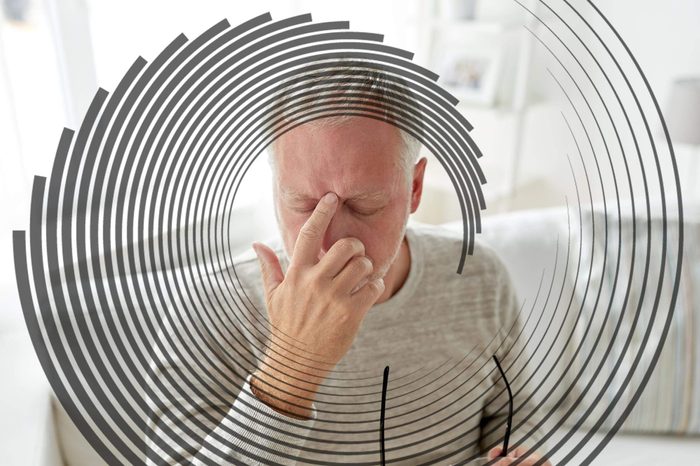
Stroke and vertigo
Another cause of central vertigo is stroke. “Fortunately, vertigo caused by stroke is pretty rare and usually only expected in older patients,” says Dr. Pescatore. “Central vertigo causes tend to be less benign and include stroke in the back of the brain. This is called a posterior circulation stroke,” explains Dr. Dalvi. Check out the stroke symptoms women are likely to ignore.
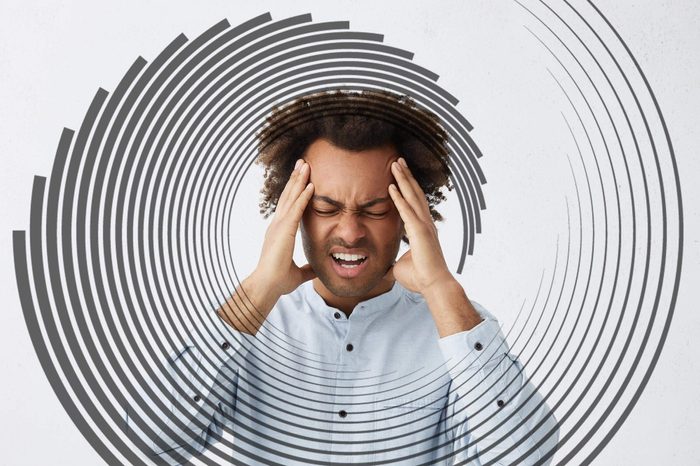
Vestibular migraine and vertigo
“Some patients with migraine may have a complicated migraine that presents with vertigo as well,” says Dr. Dalvi. This type of migraine is called MAV (migraine-associated vertigo). According to VeDA, MAV turns up in approximately 40 percent of migraine patients at least once. In addition to the often-debilitating symptoms of migraine headaches, vestibular migraines include vertigo, dizziness, and loss of balance as symptoms. There may be a new way to treat migraines in women, according to a 2017 study. (This might help you control nasty migraines.)

Habits that may make vertigo worse
“Unfortunately, most vertigo causes are out of our control,” explains Dr. Bennetsen. “However, vertigo may be induced or modified by stress, changes in barometric pressure, dehydration, and even sleep deprivation.” (Here’s why you can’t sleep at night.) Practicing good health habits: alleviate stress through meditation or yoga, stay hydrated, and get the sleep you need. “From a dietary standpoint, it is important to avoid alcohol, foods high in salt, and excessive caffeine, as any of these can make your symptoms worse. In the case of Ménière’s disease, caffeine may lead to more intense tinnitus—ringing in the ear,” he adds.
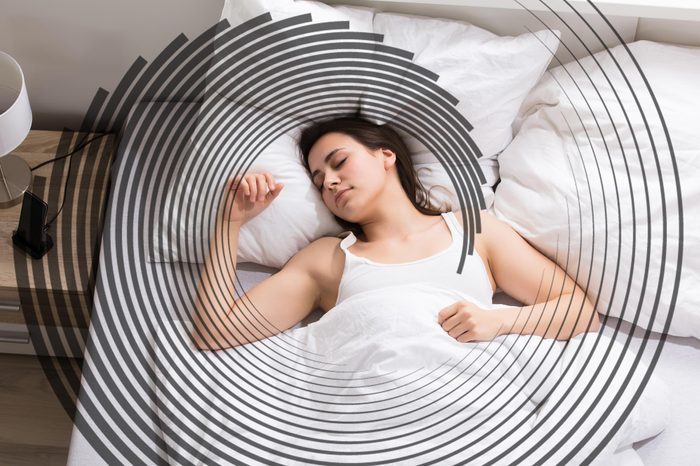
Dealing with vertigo
When vertigo strikes, try to find a place you can be still and rest. “For severe vertigo, bed rest may be required until the acute episode subsides,” says Dr. Dalvi. He also cautions that trying to walk during a severe episode of vertigo, as it can easily lead to a bad fall. “Limit your changes in position, as much as possible. Decreasing excessive neurologic stimuli, such as excessive light and sound, are of benefit as well,” adds Dr. Bennetsen.
Next, check out the other weird symptoms (aside from vertigo) that are linked to stress.
